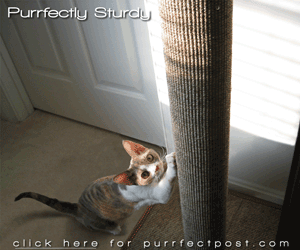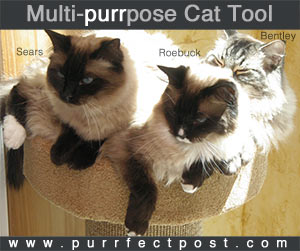Early Neutering for Kittens
 Have you heard the term “early neuter” and wondered what it means? Do you question whether it’s a good idea for your cat? Early neutering traditionally meant having surgery to prevent reproduction in male or female pets before six months of age. More veterinarians are performing neuters earlier for several reasons, including being sure to have the surgery before the first heat, having fewer surgical complications and quicker recoveries. The first heat can be at or before four months in cats, and does not occur at an exact age in any animal.
Have you heard the term “early neuter” and wondered what it means? Do you question whether it’s a good idea for your cat? Early neutering traditionally meant having surgery to prevent reproduction in male or female pets before six months of age. More veterinarians are performing neuters earlier for several reasons, including being sure to have the surgery before the first heat, having fewer surgical complications and quicker recoveries. The first heat can be at or before four months in cats, and does not occur at an exact age in any animal.
The veterinary community now widely accepts “early neuter” to mean “pediatric neuter.” This implies having the surgery at six to eight weeks of age, with the animal weighing at least two pounds1. Pediatric neuter has become the best way to deal with overpopulation in shelters. Concerns veterinarians used to have, such as anesthetic and surgical risk, are now minor, thanks to safer anesthetic drugs and more available information regarding pediatric surgery.
The decision whether to have your cat neutered is a complicated one that opens up another discussion. This article addresses only pediatric vs. regular age at neutering. There are a few negatives associated with pediatric neuter. The main three are:
Decreased Metabolic Rate in Neutered Cats
This can be prevented with proper diet and a controlled feeding regimen. Also be sure your cat is getting exercise. Many indoor cats do not get enough exercise, so consider playing with your cat using toys or teaching your cat to fetch.
Hypoglycemia During Surgery
This can be prevented by withholding food only four hours before surgery, and feeding patients immediately when standing post-operatively.
Hypothermia During Surgery
This is prevented by keeping patients warm during and after surgery. Additional effort is required with pediatric patients.
Shelters began performing pediatric neuters prior to the 1980s and have not noticed increased risk to patients. Benefits of pediatric neuter generally outweigh the risks. There will be no first heat, so risk of mammary cancer is minimal. Mammary, or breast cancer, is the third most common tumor in female cats. It occurs in 2.5% of female cats. Breast tumors are malignant in cats over 90% of the time, compared to 50.9% of the time in dogs2. Excessive bleeding, chewing sutures, sutures falling out, wound infection and internal infection are reported less frequently. Anesthesia time is often shorter as well. Pediatric neutering is endorsed by the AVMA, ASPCA, HSUS, AAHA, and multiple veterinary colleges.
Most cat owners appreciate having their pet neutered. Neutered male cats tend to have fewer behavioral problems, such as aggression, vocalizing, urine spraying and wandering in search of a female. Female neutered cats will not have bloody vaginal discharge, vocalization during heat or unwanted litters. If neutered before the first heat cycle, her risk of mammary cancer is the lowest possible. The risk of pyometra, or uterine infection, increases with age. Spaying removes the risk.
Perhaps you think it would be neat to see your cat have a litter of kittens. However, you should understand that there are risks and expenses that may be more than you initially prepare for, such as cesarean section, injuries to mother or kittens, prenatal care, and finding homes for the kittens. It is also a lot of work.
You may never need to decide whether pediatric neutering is right for your pet. Most pets are older than eight weeks when adopted. No across the board recommendation is appropriate for determining the age to neuter. As with all medical decisions, discussing this with your veterinarian will enable you to make an informed decision.



